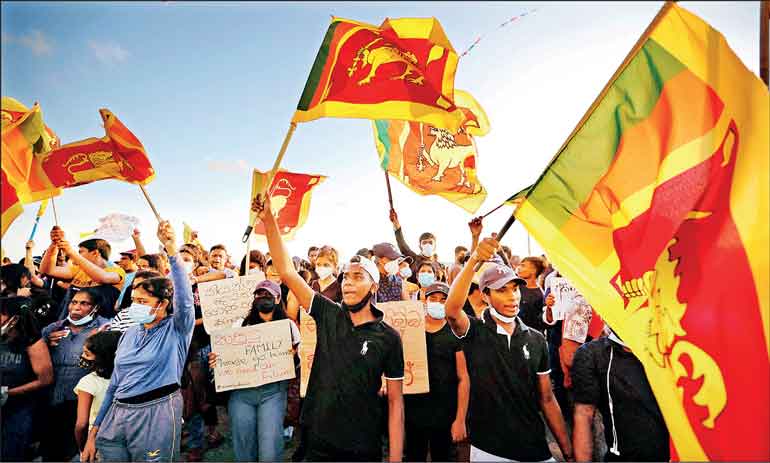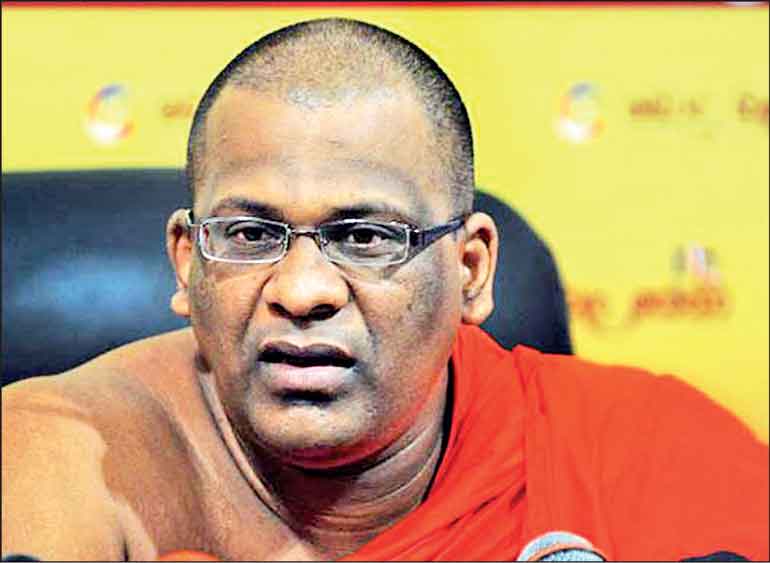Tuesday Feb 17, 2026
Tuesday Feb 17, 2026
Tuesday, 16 April 2024 00:01 - - {{hitsCtrl.values.hits}}

 Landmark judgement
Landmark judgement
Colombo High Court Judge Adithya Patabendige, a Buddhist himself, had sentenced the obstreperous Buddhist monk Gnanasara, the Secretary General of Bodu Bala Sena (BBS) for four years rigorous imprisonment plus a fine of Rs.100,000 for the monk’s inflammatory remarks on Islam and Muslims. An appeal for his bail by his sympathisers has also been rejected. This is indeed a landmark judgement specially in the face of the unchallengeable power of political Buddhism, which since 1950s has virtually set the political agenda for successive governments. The foremost status awarded to Buddhism and by implication to the Sangha in the constitution has virtually given license to villains of Gautama like Gnanasara to spread falsehoods about other faiths and get away with it. In that context, this judgement no doubt must have sent shockwaves to the island’s Buddhist supremacists whose vituperative campaigns against other faiths are too well known to be retold here. Among them however, Gnanasara Thero, a mischievous product of political Buddhism, earned his notoriety by being an inveterate critic of Islam and Muslims. There is a catalogue of incidents in which he had been identified as agent provocateur. The Aluthgama riots in 2014 for instance, were the result of this firebrand’s hate speech against Muslims. He visited conservative Kattankudy in the East, and, like that renowned trouble maker Narathar in Hindu mythology, poured oil to an old religious flame that kept the Muslims divided in that enclave. He also played a leading role in the desecration of Neeraviyadi Pillayar Hindu Temple at Chemmalai, Mullaitivu by burning the corpse of a Buddhist priest who died in Colombo.
A historical context
Even before the present judgement he was sentenced to six-year jail term for contempt of court and threatening the wife of a missing cartoonist, but was released after receiving presidential pardon in 2019 from the former President Maithripala Sirisena (MS). MS’ pardon was a politically motivated action to garner Buddhist votes at the 2019 Presidential Election, which he was planning to contest. But that pardon was a slap on the country’s judiciary never bothered him. Likewise, whether another pardon by the current President Ranil Wickremasinghe (RW) would bring Gnanasara out of prison this time also in view of a similar political scenario cannot be discounted. RW has already demonstrated his readiness to bend or ignore the laws of the country to win political scores. For instance, he allowed a Muslim parliamentarian smuggler who was caught red handed by a customs officer at the airport to escape with a small fine instead of sending him to face the full force of the law in the court. This time, RW may entice Muslim leaders to initiate a community-wide campaign pardon this prisoner, because he had regretted and apologised for his mistake. But Muslims should realise that even their Prophet did not have the right to plead with Allah to pardon Abu Lahab.

Bodu Bala Sena Secretary General Gnanasara Thero
Upholding the rule of law
Be that as it may, this sentencing by a Buddhist magistrate on a Buddhist monk demonstrates that if the judiciary is allowed to function without political interference every citizen of Sri Lanka irrespective of his or her caste, creed, religion, wealth or status would be treated equally and without prejudice. Is this not what implied by rule of law? However, that had not been the case in this country over several decades. The so-called democratic governance structured on the foundation of Sinhala-Buddhist majoritarianism has licensed a larrikin group within the Sangha to behave in the most un-Buddhist manner and still remain untouchable by the law. The political nexus between such monks and leaders in government has not only ruined the image of Sri Lanka’s democracy, but also tarnished the image of Buddhism in this country. Otherwise, how could anyone rationalise former President Gotabaya Rajapaksa’s (GR) appointment of a rabble rouser like Gnanasara to head the Presidential Task Force to implement the controversial One Country One Law (OCOL)? All this is reflection of a systemic crisis that has engulfed this nation. It was to get rid of that system and bring about a radical change that a new generation of youth staged the Aragalaya in 2022. To them GR and his authoritarianism with a Buddhist cover epitomised the decadence of the system in vogue, and they demanded its riddance.
Catalyst for change
If the departure and resignation of GR marked Aragalaya’s first victory, the sentencing of monk Gnanasara who thought no end of himself and ran amok with the laws of this country could be seen as its second victory. If presidents with executive powers could pardon murderers and appoint religious demagogues to head Task Forces, how could democracy survive and thrive in a multiethnic and multireligious society like in Sri Lanka? Aragalayists also realised that as long as judiciary remains the handmaid of the executive there will be no stopping of influential personalities to indulge in illegal acts and get away with them. It is this loophole in the prevailing socio-political system that permitted politicians themselves to exploit the economy for enhancing their private interest and bankrupt the treasury. Those politicians are still governing the country with RW’s support. Thus, the current judgement is proof that there are law enforcers who are prepared to ignore outside pressures and enforce the law without fear or favour. That is why Gnanasara’s imprisonment should be considered as another victory for the Aragalaya cause. But the ultimate challenge is to change the entire system totally and radically, and that calls for a new genre of political leadership.
A vision for system change
Of all the political parties and their coalitions vying to capture government and of all leaders who are still calculating their odds in winning the race for presidency, only National Peoples Power (NPP) and its leader Anura Kumara Dissanayake (AKD) have declared their determination to translate Aragalaya demand into action. A social revolution to change a moribund political culture along with market friendly strategies to resuscitate and restructure the economy while pursuing nonconfrontational foreign relations sum up NPP’s recipe for system change. The NPP cadre consists of relatively young and uncorrupt individuals with a variety of knowledge and working experience, but all of them equipped with a critical mind to analyse and weed out inappropriate theories and policies born out of them while willing to take the risk in devising an appropriate development strategy which would enhance the economic comfort of all citizens without depriving the main contributors to that development their due rewards. NPP reflects the political sentiments and socioeconomic yearnings of Sri Lanka’s new generation of youth. It is on their support and that of the victims of a moribund system that NPP could hope for an outright victory at the ballot box. There is no other solution to the country’s poly-crisis other than a radical U-turn and NPP has declared its readiness to make it a reality.
“What would the Tamils gain by voting Sinhalese politicians” is a strange question that one hears from certain erudite quarters from the north. On that vein what would Muslims gain by voting for Sinhalese and Tamil politicians, and what would Tamils and Muslims gain by voting their own politicians? This divisive and myopic mentality is the curse of this island and the product of a decadent system that not only deprived minorities of their due shares in the national cake, but even failed to recognize their right to exist in this country. Hence the intergenerational revolt against that system. Like the Aragalaya, NPP is also a-ethnic and a-religious. True, the taste of pudding is in eating it. Why then cannot these minorities give a chance to this new genre of politics and politicians?
(The writer is attached to Business School, Murdoch University, W. Australia.)